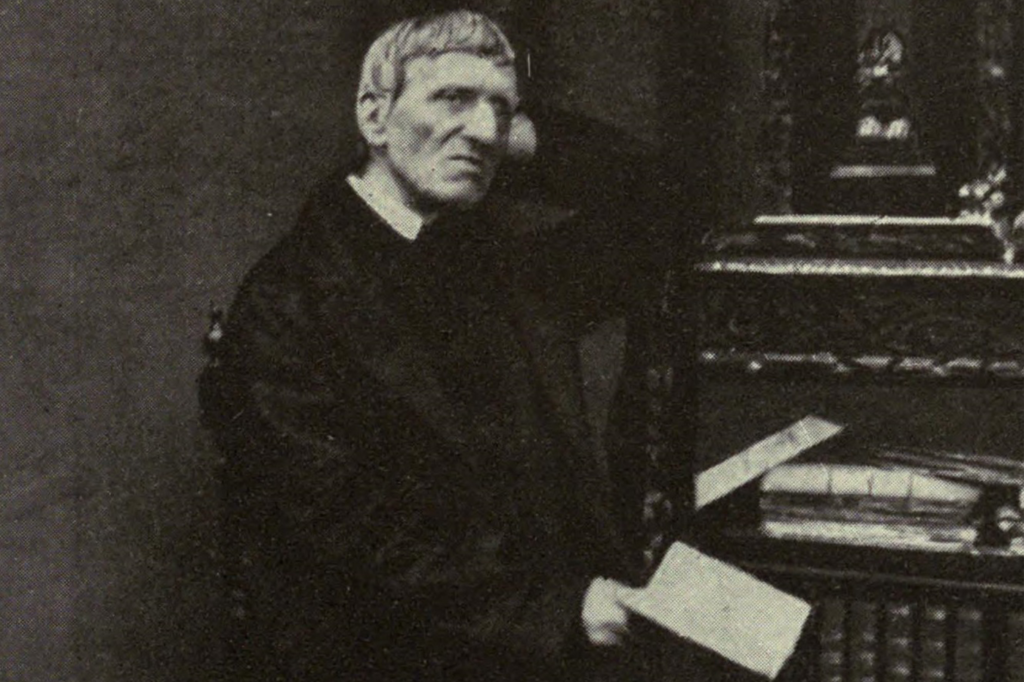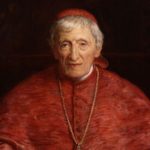John Henry Newman’s teachings provide a proper grounding for freedom of conscience and for the Catholic Church’s duty to defend the truth, both to its members and to society in general. In both of these ways, Newman prefigured the Church’s 1965 Declaration on Religious Freedom, Dignitatis Humanae. Together, Newman and Dignitatis can help us resist the erroneous notion of the free conscience pointed inward to self and isolated from God and nature. Instead, they teach that a truly free conscience is oriented toward God, who, more intimate to self and nature than anyone or anything, is the only guarantor of true freedom. Since Newman’s time, this error has damaged free societies and entered the Church itself. Following Newman and Dignitatis will permit us to defend true freedom of conscience, both within the Church, and for everyone, everywhere.
Newman writes that conscience is the voice of God: “[It] is a messenger from Him, who, both in nature and in grace, speaks to us behind a veil, and teaches and rules us by His representatives.” These are the Magisterium and the fundamental teachings of the Church on faith and morals as the path to true freedom and happiness in this life and the next.
Dignitatis Humanae declares the right of every person to religious freedom, defined as an immunity from coercion in matters of conscience by any human agent, including the state and the Church. “God calls men to serve Him in spirit and in truth,” declares Dignitatis, “hence they are bound in conscience but they stand under no compulsion. God has regard for the dignity of the human person whom He Himself created and man is to be guided by his own judgment and he is to enjoy freedom” (emphasis added).
Dignitatis is here affirming the ancient teaching of the Church that a man must obey God but that he must also follow his conscience, even if it errs. Newman puts it this way: “if a man is culpable in being in error, which he might have escaped had he been more in earnest, for that error he is answerable to God, but still he must act according to that error. . . because he in full sincerity thinks the error to be truth” (emphasis added).
Start your day with Public Discourse
Sign up and get our daily essays sent straight to your inbox.Note the dilemma. You and I must act in accord with our consciences. God has given us that freedom, and no one can licitly employ coercion to restrict it. But we are also bound in conscience to obey God. An erring conscience that results from our failure to ensure that it is ordered to the truth leads to moral culpability. Willful pursuit of the wrong could lead one into grave sin. A man could follow an ill-formed conscience straight into hell.
In short, our freedom does not give us a moral right to do what is wrong. To the contrary, it merely increases the importance of ordering our judgments of conscience to the truth. Dignitatis puts it this way: “Religious freedom . . . has to do with immunity from coercion in civil society. Therefore it leaves untouched traditional Catholic doctrine on the moral duty of men and societies toward the true religion and toward the one Church of Christ.” This helps us to understand why the Church must have the liberty to makes its claims about true freedom and justice within civil society, and why it must have the courage to perform that duty.
Newman’s explanation of conscience and freedom drives this point home. He rejected the false and dangerous view of conscience emerging in the nineteenth century: “[I]n this age . . . the very right and freedom of conscience [is seen as the right] to dispense with conscience, to ignore a Lawgiver and Judge, to be independent of unseen obligations. Conscience is a stern monitor, but in this century it has been superseded by a counterfeit . . . [that is,] the right of self-will.” “Conscience,” he famously wrote, “has rights”—that is, freedom—“because it has duties.” Those duties consist in the individual’s vigilance in ordering conscience to the truths given by God to the Church, and the Church’s clarity and effectiveness in teaching those truths.
In this, as in so much else, Newman was prophetic. In the 130 years since his death, few concepts have been more misunderstood and distorted than “conscience.” The danger is greater today than when the great saint wrote. He blamed the error on science and philosophy but insisted that in his day most Protestants and Catholics still believed that conscience was “the voice of God in the nature and heart of man . . . the internal witness of both the existence and the law of God.”
That is no longer the case. The distorted view of conscience that Newman described as oriented to self and not to God has penetrated Western culture and religion. For many, the obligation to follow one’s conscience has been embraced, but fidelity to truth has been set aside. This untethered and counterfeit “freedom of conscience” has led to a widespread subjectivism that Newman saw emerging within modern European society, even in his own day.
In the years since, this counterfeit view of conscience has contributed to growing disbelief in God and the radical assertion of human autonomy from nature and physical realities. Today Western nations are characterized by ever deepening cultural and political chasms between those who believe that ethical norms are grounded in nature and nature’s God, and those who believe that freedom itself establishes the norms of social ethics. This counterfeit view has encouraged, within the Church and without, deep confusion regarding the nature of man and woman as created by God; the beautiful truths about marriage, the family, and human sexuality; and the necessity of religious freedom for all persons and all societies.
It is for these reasons that Dignitatis demands not only an immunity from coercion, but also libertas ecclesiae, the Church’s right—protected in law and culture—to make public its claims about true freedom, justice, and the power of God’s love. Newman exhorts the Church to justify the right by performing the duty, that is, by professing the profound connection between the individual conscience and the Church’s public witness to the truth about nature and about Jesus Christ.
The errors of our age, far more pervasive than in the age of Newman, place a greater responsibility on the faithful, clergy and lay, to teach and witness these truths. We desperately need the clarity and winsomeness of truth itself, which is a man, Jesus Christ, and Him crucified. In his final sermon as an Anglican before entering the Roman Catholic Church, entitled “The Parting of Friends,” Newman asked his congregation to “remember such a one in time to come, though you hear him not, and pray for him, that in all things he may know God’s will, and at all times he may be ready to fulfill it.” Let us, with the great saint at our side, go forth to defend these truths anew, with hope, joy, courage, and true freedom of conscience.
This essay is adapted from remarks delivered at a conference at The Pontifical University of St. Thomas Aquinas (Angelicum) in Rome during the canonization events for Saint John Henry Newman.













